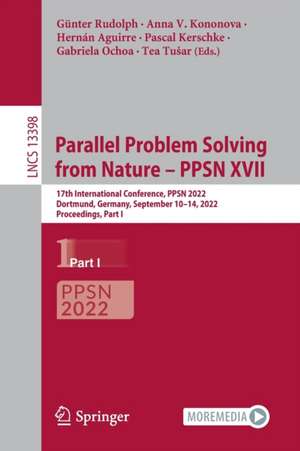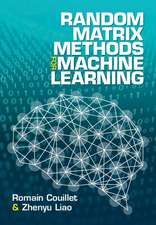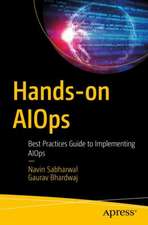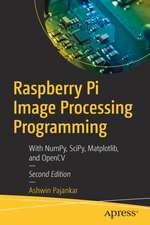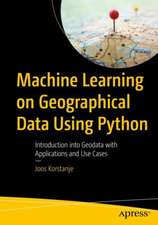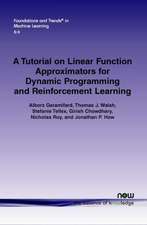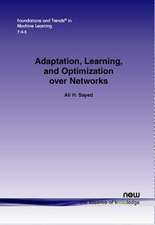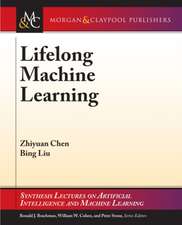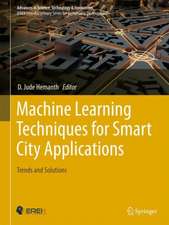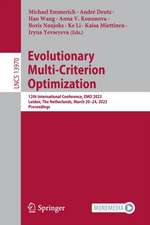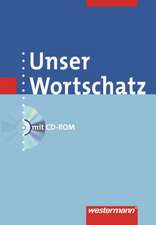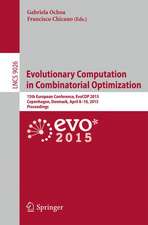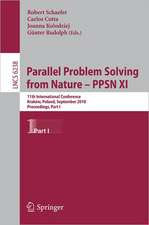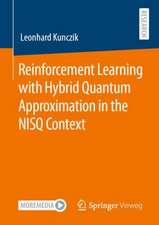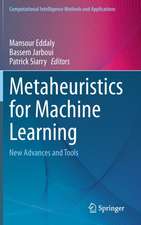Parallel Problem Solving from Nature – PPSN XVII: 17th International Conference, PPSN 2022, Dortmund, Germany, September 10–14, 2022, Proceedings, Part I: Lecture Notes in Computer Science, cartea 13398
Editat de Günter Rudolph, Anna V. Kononova, Hernán Aguirre, Pascal Kerschke, Gabriela Ochoa, Tea Tušaren Limba Engleză Paperback – 15 aug 2022
| Toate formatele și edițiile | Preț | Express |
|---|---|---|
| Paperback (2) | 474.47 lei 3-5 săpt. | +37.38 lei 7-13 zile |
| Springer International Publishing – 15 aug 2022 | 474.47 lei 3-5 săpt. | +37.38 lei 7-13 zile |
| Springer International Publishing – 16 aug 2022 | 833.89 lei 6-8 săpt. |
Din seria Lecture Notes in Computer Science
- 20%
 Preț: 1061.55 lei
Preț: 1061.55 lei - 20%
 Preț: 307.71 lei
Preț: 307.71 lei - 20%
 Preț: 438.69 lei
Preț: 438.69 lei - 20%
 Preț: 645.28 lei
Preț: 645.28 lei -
 Preț: 410.88 lei
Preț: 410.88 lei - 15%
 Preț: 580.46 lei
Preț: 580.46 lei - 17%
 Preț: 427.22 lei
Preț: 427.22 lei - 20%
 Preț: 596.46 lei
Preț: 596.46 lei -
 Preț: 449.57 lei
Preț: 449.57 lei - 20%
 Preț: 353.50 lei
Preț: 353.50 lei - 20%
 Preț: 1414.79 lei
Preț: 1414.79 lei - 20%
 Preț: 309.90 lei
Preț: 309.90 lei - 20%
 Preț: 583.40 lei
Preț: 583.40 lei - 20%
 Preț: 1075.26 lei
Preț: 1075.26 lei - 20%
 Preț: 310.26 lei
Preț: 310.26 lei - 20%
 Preț: 655.02 lei
Preț: 655.02 lei - 20%
 Preț: 580.93 lei
Preț: 580.93 lei - 20%
 Preț: 340.32 lei
Preț: 340.32 lei - 18%
 Preț: 938.83 lei
Preț: 938.83 lei - 20%
 Preț: 591.51 lei
Preț: 591.51 lei - 15%
 Preț: 438.59 lei
Preț: 438.59 lei - 20%
 Preț: 337.00 lei
Preț: 337.00 lei -
 Preț: 389.48 lei
Preț: 389.48 lei - 20%
 Preț: 607.39 lei
Preț: 607.39 lei - 20%
 Preț: 1024.44 lei
Preț: 1024.44 lei - 20%
 Preț: 579.30 lei
Preț: 579.30 lei - 20%
 Preț: 763.23 lei
Preț: 763.23 lei - 20%
 Preț: 453.32 lei
Preț: 453.32 lei - 20%
 Preț: 575.48 lei
Preț: 575.48 lei - 20%
 Preț: 585.88 lei
Preț: 585.88 lei - 20%
 Preț: 825.93 lei
Preț: 825.93 lei - 20%
 Preț: 763.23 lei
Preț: 763.23 lei - 17%
 Preț: 360.19 lei
Preț: 360.19 lei - 20%
 Preț: 1183.14 lei
Preț: 1183.14 lei - 20%
 Preț: 340.32 lei
Preț: 340.32 lei - 20%
 Preț: 504.57 lei
Preț: 504.57 lei - 20%
 Preț: 369.12 lei
Preț: 369.12 lei - 20%
 Preț: 583.40 lei
Preț: 583.40 lei - 20%
 Preț: 343.62 lei
Preț: 343.62 lei - 20%
 Preț: 350.21 lei
Preț: 350.21 lei - 20%
 Preț: 764.89 lei
Preț: 764.89 lei - 20%
 Preț: 583.40 lei
Preț: 583.40 lei - 20%
 Preț: 649.49 lei
Preț: 649.49 lei - 20%
 Preț: 341.95 lei
Preț: 341.95 lei - 20%
 Preț: 238.01 lei
Preț: 238.01 lei - 20%
 Preț: 538.29 lei
Preț: 538.29 lei
Preț: 474.47 lei
Preț vechi: 593.09 lei
-20% Nou
Puncte Express: 712
Preț estimativ în valută:
90.79€ • 94.79$ • 75.14£
90.79€ • 94.79$ • 75.14£
Carte disponibilă
Livrare economică 15-29 martie
Livrare express 01-07 martie pentru 47.37 lei
Preluare comenzi: 021 569.72.76
Specificații
ISBN-13: 9783031147135
ISBN-10: 3031147138
Pagini: 619
Ilustrații: XXIV, 619 p. 202 illus., 189 illus. in color.
Dimensiuni: 155 x 235 x 38 mm
Greutate: 0.89 kg
Ediția:1st ed. 2022
Editura: Springer International Publishing
Colecția Springer
Seria Lecture Notes in Computer Science
Locul publicării:Cham, Switzerland
ISBN-10: 3031147138
Pagini: 619
Ilustrații: XXIV, 619 p. 202 illus., 189 illus. in color.
Dimensiuni: 155 x 235 x 38 mm
Greutate: 0.89 kg
Ediția:1st ed. 2022
Editura: Springer International Publishing
Colecția Springer
Seria Lecture Notes in Computer Science
Locul publicării:Cham, Switzerland
Cuprins
Automated Algorithm Selection in Single-Objective Continuous Optimization: A Comparative Study of Deep Learning and Landscape Analysis Methods.- Improving Nevergrad's Algorithm Selection Wizard NGOpt through Automated Algorithm Configuration.- Non-Elitist Selection Can Improve the Performance of Irace.- Per-run Algorithm Selection with Warm-starting using Trajectory-based Features.- Efficient Approximation of Expected Hypervolume Improvement using Gauss-Hermite Quadrature.- A Systematic Approach to Analyze the Computational Cost of Robustness in Model-Assisted Robust Optimization.- Adaptive Function Value Warping for Surrogate Model Assisted Evolutionary Optimization.- Finding Knees in Bayesian Multi-Objective Optimization.- High Dimensional Bayesian Optimization with Kernel Principal Component Analysis.- Single Interaction Multi-Objective Bayesian Optimization.- Surrogate-assisted LSHADE algorithm utilizing Recursive Least Squares filter.- Towards Efficient Multiobjective Hyperparameter Optimization: A Multiobjective Multi-Fidelity Bayesian Optimization and Hyperband Algorithm.- A Continuous Optimisation Benchmark Suite from Neural Network Regression.- BBE: Basin-Based Evaluation of Multimodal Multi-Objective Optimization Problems.- Evolutionary Approaches to Improving the Layouts of Instance-Spaces.- A novelty-search approach to filling an instance-space with diverse and discriminatory instances for the knapsack problem.- Co-Evolutionary Diversity Optimisation for the Traveling Thief Problem.- Computing High-Quality Solutions for the Patient Admission Scheduling Problem using Evolutionary Diversity Optimisation.- Cooperative Multi-Agent Search on Endogenously-Changing Fitness Landscapes.- Evolutionary Algorithm for Vehicle Routing with Diversity Oscillation Mechanism.- Evolutionary Algorithms for Limiting the Effect of Uncertainty for the Knapsack Problem with Stochastic Profits.- Self-adaptation via Multi-objectivisation: An Empirical Study.- The Combined Critical Node and Edge Detection Problem. An Evolutionary Approach.- Attention-Based Genetic Algorithm for Adversarial Attack in Natural Language Processing.- Deep Reinforcement Learning with Two-Stage Training Strategy for Practical Electric Vehicle Routing Problem with Time Windows.- Evolving Through the Looking Glass: Learning Improved Search Spaces with Variational Autoencoders.- Generalization and Computation for Policy Classes of Generative Adversarial Imitation Learning.- Generative Models over Neural Controllers for Transfer Learning.- HVC-Net: Deep Learning based Hypervolume Contribution Approximation.- Multi-objective Evolutionary Ensemble Pruning Guided by Margin Distribution.- Revisiting Attention-based Graph Neural Networks for Graph Classification.- Robust Neural Network Pruning by Cooperative Coevolution.- SemiGraphFL: Semi-Supervised Graph Federated Learning.- Evolutionary Design of Reduced Precision Preprocessor for Levodopa-Induced Dyskinesia Classifier.- In-Materio Extreme Learning Machines.- On the impact of the duration of evaluation episodes on the evolution of adaptive robots.- Analysing the Fitness Landscape Rotation for Combinatorial Optimisation.- Analysis of Search Landscape Samplers for Solver Performance Prediction on a University Timetabling Problem.- Fractal Dimension and Perturbation Strength: A Local Optima Networks View.- HPO X ELA: Investigating Hyperparameter Optimization Landscapes by Means of Exploratory Landscape Analysis.- Increasing the Diversity of Benchmark Function Sets through Affine Recombination.- Neural Architecture Search: A Visual Analysis. - Digging into Semantics: Where do search-based software repair methods search?.- Gene-pool Optimal Mixing in Cartesian Genetic Programming.- Genetic programming for combining directional changes indicators in international stock markets.- Importance-Aware Genetic Programming for Automated Scheduling Heuristics Learning in Dynamic Flexible Job Shop Scheduling.- Towards Discrete Phenotypic Recombination in Cartesian Genetic Programming.- A general architecture for generating interactive decomposition-based MOEAs.- An Exact Inverted Generational Distance for Continuous Pareto Front.- Direction Vector Selection for R2-based Hypervolume Contribution Approximation.- Do We Really Need to Use Constraint Violation in Constrained Evolutionary Multi-Objective Optimization?.- Dynamic Multi-modal Multi-objective Optimization: A Preliminary Study.- Fair Feature Selection with a Lexicographic Multi-Objective Genetic Algorithm.- Greedy Decremental Quick Hypervolume Subset Selection Algorithms.- Hybridizing Hypervolume-based Evolutionary Algorithms and Gradient Descent by Dynamic Resource Allocation.- Identifying Stochastically Non-dominated Solutions Using Evolutionary Computation.- Large-scale multi-objective influence maximisation with network downscaling.- Multi-Objective Evolutionary Algorithm Based on the Linear Assignment Problem and the Hypervolume Approximation using Polar Coordinates (MOEA-LAPCO).- New Solution Creation Operator in MOEA/D for Faster Convergence.- Obtaining Smoothly Navigable Approximation Sets in Bi-Objective Multi-Modal Optimization.- T-DominO: Exploring Multiple Criteria with Quality-Diversity and the Tournament Dominance Objective.- Recombination Weight based Selection in the DTS-CMA-ES.- The (1+1)-ES Reliably Overcomes Saddle Points.- Collective Learning of Low-Memory Matrix Adaptation for Large-Scale Black-Box Optimization.- Evolutionary Time-Use Optimization for Improving Children's Health Outcomes.- Iterated Local Search for the eBuses Charging Location Problem.- Multi-view clustering of heterogeneous health data: Application to systemic sclerosis.- Specification-Driven Evolution of Floor Plan Design.- Surrogate-assisted Multi-objective Optimization for Compiler Optimization Sequence Selection.- A First Runtime Analysis of the NSGA-II on a Multimodal Problem.- Analysis of Quality Diversity Algorithms for the Knapsack Problem.- Better Running Time of the Non-dominated Sorting Genetic Algorithm II (NSGA-II) by Using Stochastic Tournament Selection.- Escaping Local Optima With Local Search: A Theory-Driven Discussion.- Evolutionary Algorithms for Cardinality-Constrained Ising Models.- General Univariate Estimation-of-Distribution Algorithms.- Population Diversity Leads to Short Running Times of Lexicase Selection.- Progress Rate Analysis of Evolution Strategies on the Rastrigin Function: First Results.- Running Time Analysis of the (1+1)-EA using Surrogate Models on OneMax and LeadingOnes.- Runtime Analysis of Simple Evolutionary Algorithms for the Chance-constrained Makespan Scheduling Problem.- Runtime Analysis of the (1+1) EA on Weighted Sums of Transformed Linear Functions.- Runtime Analysis of Unbalanced Block-Parallel Evolutionary Algorithms.- Self-adjusting Population Sizes for the (1, λ)-EA on Monotone Functions.- Theoretical Study of Optimizing Rugged Landscapes with the cGA.- Towards Fixed-Target Black-Box Complexity Analysis.- Two-Dimensional Drift Analysis: Optimizing Two Functions Simultaneously Can Be Hard.
